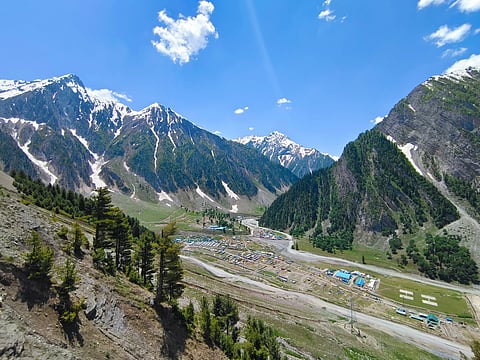
- LIFESTYLE
- FASHION
- FOOD
- ENTERTAINMENT
- EVENTS
- CULTURE
- VIDEOS
- WEB STORIES
- GALLERIES
- GADGETS
- CAR & BIKE
- SOCIETY
- TRAVEL
- NORTH EAST
- INDULGE CONNECT

Among the many sacred pilgrimages in India, the Amarnath Yatra truly shines with its deep spiritual significance and stunning landscapes. Every year, devotees from all over the globe trek into the South Kashmir Himalayas to see the naturally formed ice lingam, which is believed to represent Lord Shiva. For 2025, the yatra is scheduled from July 25 to August 19, allowing daily access for 15,000 pilgrims. Registration is now open, and the Shri Amarnath Shrine Board has put in place a strict set of food regulations to maintain the safety and sanctity of this sacred journey.
Due to the high altitude and the physically challenging trek, certain foods have been banned because they can negatively impact digestion and energy levels. These guidelines also aim to maintain spiritual discipline and prevent waste along the path.
Fried and oily foods like poori, bhature, pakoras, samosas, burgers, stuffed parathas, and snacks such as chips, kurkure, and namkeen mixtures are not allowed. Additionally, sugary treats like halwa, jalebi, gulab jamun, khoya burfi, rasgulla, and laddu are off the menu. Processed foods like chowmein, pasta, Maggi, and soft drinks are also prohibited. Non-vegetarian items and all intoxicants—including alcohol, tobacco, gutka, pan masala, and cigarettes—are strictly banned.
To help maintain energy levels and ensure smooth digestion, authorities have provided a list of recommended food items. Pilgrims are encouraged to enjoy cereals, pulses, rice, fresh vegetables, fruits, sprouts, and light South Indian dishes like idli, sambar, uttapam, and poha. Snacks such as khakra, roasted papad, til laddoos, chikki, and dried fruits like figs, raisins, and apricots are permitted. Herbal tea, lemon water, jaggery, and low-fat dairy products are also on the approved list.
To help pilgrims adhere to these dietary guidelines, langars (community kitchens) run by religious and non-profit organisations will provide nutritious meals throughout the yatra.
To support these dietary norms, the Shrine Board will reportedly deploy checkpoints along the route and coordinate with langars (community kitchens) to ensure they serve only approved food items. Signage and volunteers will help educate pilgrims along the way.
By following these guidelines, devotees can undertake a safer, healthier, and spiritually enriching Amarnath Yatra in 2025.